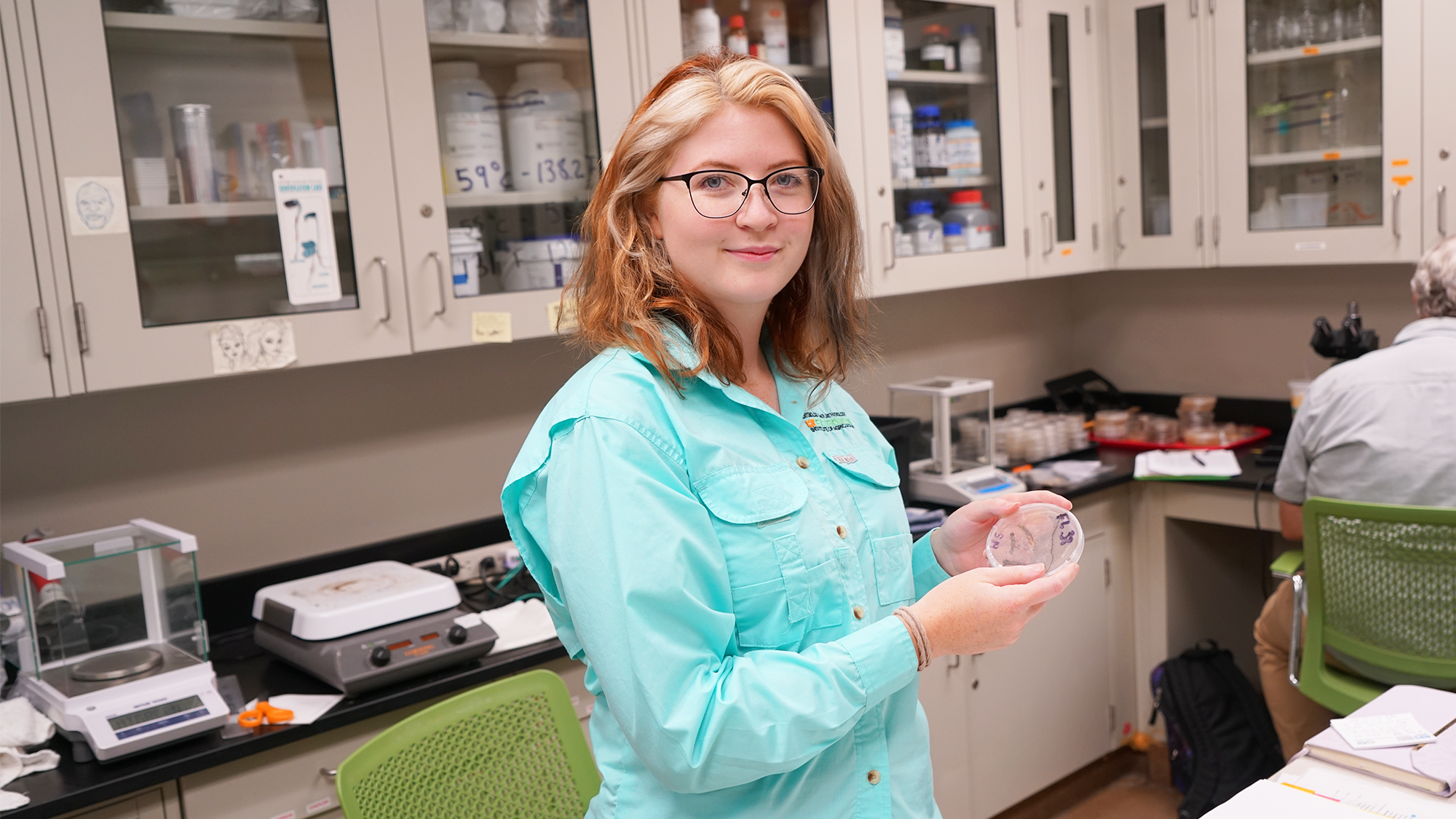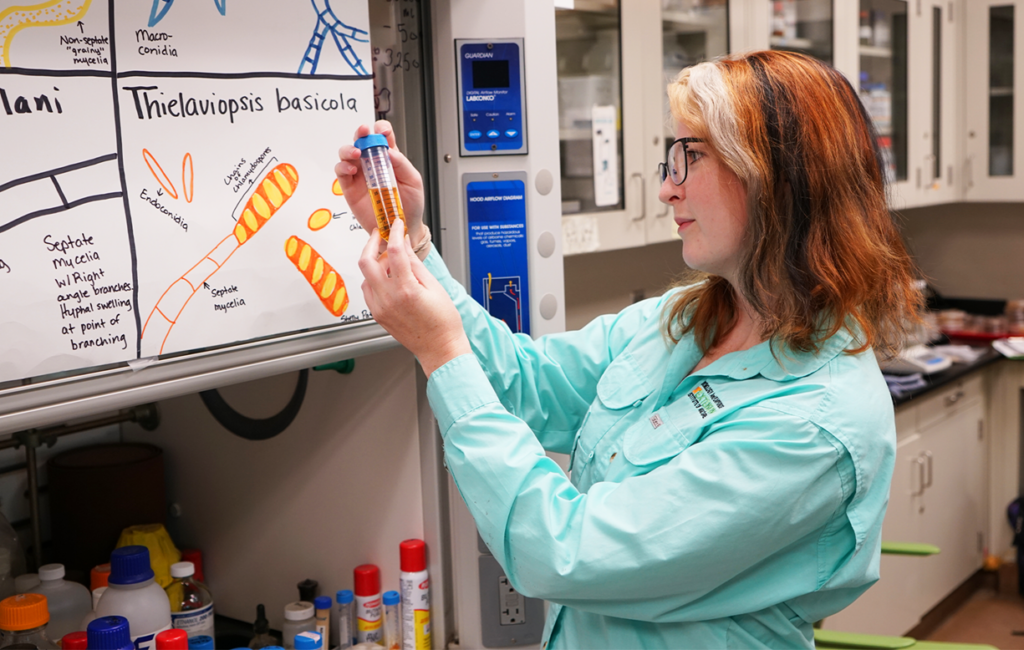
Entomology and Plant Pathology PhD student finds community and purpose through fieldwork and fellowship at the West Tennessee AgResearch and Education Center
Where are you from, and how did your journey lead you to the Herbert College of Agriculture?
I’m from Crockett Mills, Tennessee, a small town that locals would describe as “head past the co-op and Safari Park, then take a right by them horses.” For non-Tennessee natives, it’s somewhere between Memphis and Nashville. My journey with the Herbert College of Agriculture began as an undergraduate intern at the West Tennessee AgResearch and Education Center. There, I gained experience in both plant pathology and entomology during my time in the USDA-funded Research and Extension Experiences for Undergraduates (REEU) program. This sparked my passion for agricultural research and showed me how impactful this work can be. I went on to Auburn University to earn a master’s degree in entomology, then returned to the Center to pursue my PhD in plant pathology with the University of Tennessee under Dr. Heather Kelly – bringing me full circle to where it all started.
What inspired you to major in plant pathology, and what interests you most about this field?
Growing up in a family of row crop farmers, agriculture has always been a big part of my life. Along with that, I’ve always had a love for science and nature. As a kid, I filled sketchbooks with native plants and animals I’d identified and spent my allowance on aquariums and different plant species. Plant pathology perfectly combines my love for science and my roots in agriculture. What interests me the most about the research I do is the overall focus on sustainability. Not only does it benefit farmers, but it also drives for integrated pest management (IPM) solutions that are better for our environment without compromising safety or effectiveness.
Have there been any specific classes, research experiences, or professors at Herbert that have had a significant impact on your academic journey?
So many. Although I’m a distance learner, meaning I take my UT Knoxville classes online while conducting research at the Center, I’ve learned so much from both my online professors and the ones here at the center.
One of the things I love most about working under Dr. Kelly is that she heavily encourages her students to network – whether it’s through Extension events, industry internships, or conferences to present our research. Being a more introverted person, it’s difficult for me to put myself out there. But being able to attend these programs has pushed me out of my comfort zone, allowing me to develop skills that I likely never would have improved without her nudge. I’m not only a better presenter, but I’m also a more skilled communicator and collaborator than ever before, which are necessary skills to have in scientific research.
Another professor I’d like to shine a light on is Dr. Emine Fidan and her Data Analytics in Agricultural and Ecological Systems course. Although I’ve had classes on data analysis before, I’ve always struggled with wrapping my head around these concepts. It has always felt like my Achilles’ heel going into research, but she made learning analytics engaging, rewarding, and most of all, fun! Although I still don’t consider myself a data wizard, her course increased my confidence in my coding and debugging abilities.
Congratulations on being named a Foundation for Food and Agriculture Research (FFAR) fellow for the 2025 cohort! Can you tell us about this achievement and what the program entails?
Thank you! Words cannot describe how thrilled I was to be selected as a 2025-2028 FFAR Fellow. This program supports graduate students working on agricultural innovations, with the focus of this cohort being on cultivating thriving production systems, sustaining vibrant ecosystems, and bolstering healthy food systems. Apart from this research focus, the FFAR program also works with graduate students to foster professional development, leadership training, and connect us with industry professionals that will help map our career paths. Two of my mentors, Dr. Autumn McLaughlin and fellow graduate student Elias Zuchelli, were also in the FFAR program. They cannot overstate how much it taught them about themselves, Elias often says that “professional development is closely related to personal development.” I find this to be very true.
How has being located at the West Tennessee AgResearch and Education Center contributed to your research and accomplishments?
When working in field research, we deal with a lot of variables that come with performing science outdoors. The Center is basically a whole hub dedicated to field research. Whether you have questions about plant pathology, entomology, weed science, physiology… you name it, we have a scientist right down the hall who can advise you on it. Plus, there are lots of opportunities to gain experience outside of your specialty!

There’s also a strong sense of community here. We have several graduate students across departments who make an effort to get together to grill out, play trivia, and grab lunch. Being able to bounce ideas with fellow students from different research/academic backgrounds can give you new perspectives on your own project. And aside from that, it’s good to have friends.
What have been some of your most rewarding or memorable experiences at Herbert?
One of the greatest parts of working at Herbert is getting to mentor undergraduate interns and watching them grow into confident researchers. It’s so rewarding to have an undergraduate come in just looking for a summer job, and then them finding out how much they enjoy agricultural research. It’s like looking in a mirror, because that’s exactly what sparked my passion for this work. I hope that I can make research feel as interesting and impactful as my previous mentors did for me and then spark that passion for future field scientists!
What advice would you give to future Herbert students who want to make the most of their time at UT?
You can have the best classes, the best project, and the best job in the world. But ultimately, it’s your relationship with the people around you that has the biggest impact on your experience – and that’s true for anywhere you go. My advice is to be a team player. Build strong relationships with your lab mates, professors, and mentors. Be real, ask questions, take advantage of the opportunities you’re given, and most importantly, enjoy it! With the right people, even a 100-degree day shucking ears in a corn field can turn into a great memory.
Upon completion of your doctoral degree, what’s next for you? Do you have any specific career or educational goals that your time at Herbert has helped prepare you for?
Honestly, there are so many career paths I would enjoy that it’s hard to choose just one, but field research has always had my heart. I would love to lead a research team focused on developing sustainable crop protection strategies. As the battle continues with pesticide resistance, food safety, and other concerns, I want to help shape agricultural systems that are not only profitable, but also environmentally responsible. My time at Herbert will prepare me for this next step by giving me a strong foundation in applied science while building my skills in mentoring, communication, and leadership.
What are some of your hobbies or a fun fact about you that people might be surprised to learn?
I’m a hobby collector, dabbling in needle felting, fishkeeping, mushroom hunting, terrarium designing, animation, herping, embroidery… the list goes on. But the two hobbies that have never left my side are art and gaming. If you hand me a sketchbook or a controller, I’ll be entertained for hours! I’m also a huge nerd in general. I especially enjoy sci-fi/fantasy themes where there are creatures and flora that you can’t find on earth, so anything adjacent to things like Avatar, the Alien franchise, Godzilla, Lord of the Rings, etc. will have me hooked!
